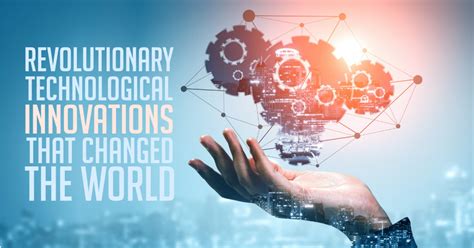The world of technology is constantly evolving, and innovations are emerging at an unprecedented rate. From artificial intelligence to the Internet of Things, these advancements are transforming the way we live, work, and interact with one another. In this article, we'll delve into the most exciting innovations shaping our future and explore their potential impact on society.

The future of technology holds much promise, with innovations like quantum computing, biometrics, and 5G networks poised to revolutionize industries and improve our daily lives. As we navigate this complex landscape, it's essential to understand the potential benefits and challenges associated with these emerging technologies.
Artificial Intelligence: The Future of Work
Artificial intelligence (AI) is transforming the way we work, from automating tasks to enhancing decision-making processes. AI-powered tools are increasingly being used in various industries, including healthcare, finance, and transportation. According to a report by McKinsey, AI has the potential to add $15.7 trillion to the global economy by 2030.
However, the rise of AI also raises concerns about job displacement and the need for workers to develop new skills. As AI assumes more routine tasks, there will be a growing demand for professionals with expertise in areas like data science, machine learning, and programming.

Benefits of AI in the Workplace
- Improved Efficiency: AI can automate repetitive tasks, freeing up employees to focus on more strategic and creative work.
- Enhanced Decision-Making: AI-powered tools can analyze vast amounts of data, providing insights that inform business decisions.
- Personalized Customer Experience: AI-driven chatbots and virtual assistants can provide 24/7 customer support, enhancing the overall customer experience.
The Internet of Things: Connecting Our World
The Internet of Things (IoT) refers to the network of physical devices, vehicles, and other items embedded with sensors, software, and connectivity, allowing them to collect and exchange data. The IoT has the potential to transform industries like manufacturing, transportation, and energy management.
According to a report by Gartner, the number of IoT devices is expected to reach 25 billion by 2025, with the global IoT market projected to reach $1.4 trillion by 2027.

Benefits of IoT
- Increased Efficiency: IoT devices can optimize energy consumption, reduce waste, and improve supply chain management.
- Improved Safety: IoT sensors can detect potential hazards, enabling predictive maintenance and reducing the risk of accidents.
- Enhanced Customer Experience: IoT-enabled devices can provide personalized experiences, such as smart home automation and wearable technology.
Quantum Computing: The Future of Problem-Solving
Quantum computing is a revolutionary technology that uses quantum-mechanical phenomena to perform calculations that are exponentially faster and more powerful than classical computers. Quantum computing has the potential to solve complex problems in fields like medicine, finance, and climate modeling.
According to a report by IBM, quantum computing can help solve complex problems like simulating molecules, optimizing supply chains, and analyzing vast amounts of data.

Benefits of Quantum Computing
- Solving Complex Problems: Quantum computing can simulate complex systems, enabling breakthroughs in fields like medicine and finance.
- Optimizing Processes: Quantum computing can optimize supply chains, logistics, and other business processes.
- Analyzing Big Data: Quantum computing can analyze vast amounts of data, providing insights that inform business decisions.
Biometrics: The Future of Identity Verification
Biometrics is the use of unique physical or behavioral characteristics, such as fingerprints, facial recognition, or voice recognition, to verify an individual's identity. Biometrics has the potential to revolutionize identity verification, making it more secure and convenient.
According to a report by MarketsandMarkets, the global biometrics market is expected to reach $59.31 billion by 2025, with the adoption of biometric technologies increasing in industries like finance, healthcare, and government.

Benefits of Biometrics
- Improved Security: Biometrics provides a more secure form of identity verification, reducing the risk of identity theft and fraud.
- Convenience: Biometrics enables convenient and seamless identity verification, eliminating the need for passwords and PINs.
- Personalization: Biometrics can provide personalized experiences, such as tailored recommendations and targeted advertising.
5G Networks: The Future of Connectivity
5G networks are the next generation of wireless technology, promising faster speeds, lower latency, and greater connectivity. 5G has the potential to transform industries like healthcare, finance, and transportation.
According to a report by Ericsson, 5G networks are expected to reach 1.5 billion subscribers by 2025, with the global 5G market projected to reach $667 billion by 2026.

Benefits of 5G Networks
- Faster Speeds: 5G networks provide faster speeds, enabling the transfer of large amounts of data in real-time.
- Lower Latency: 5G networks reduce latency, enabling real-time communication and feedback.
- Greater Connectivity: 5G networks provide greater connectivity, enabling the Internet of Things and smart cities.






What is the future of technology?
+The future of technology is exciting and rapidly evolving, with innovations like artificial intelligence, the Internet of Things, and quantum computing transforming industries and improving our daily lives.
How will AI impact the job market?
+AI has the potential to automate routine tasks, but it will also create new job opportunities in areas like data science, machine learning, and programming.
What is the Internet of Things?
+The Internet of Things refers to the network of physical devices, vehicles, and other items embedded with sensors, software, and connectivity, allowing them to collect and exchange data.
As we look to the future, it's clear that technology will continue to play a major role in shaping our world. From artificial intelligence to 5G networks, these innovations have the potential to transform industries and improve our daily lives. As we navigate this complex landscape, it's essential to understand the potential benefits and challenges associated with these emerging technologies.
